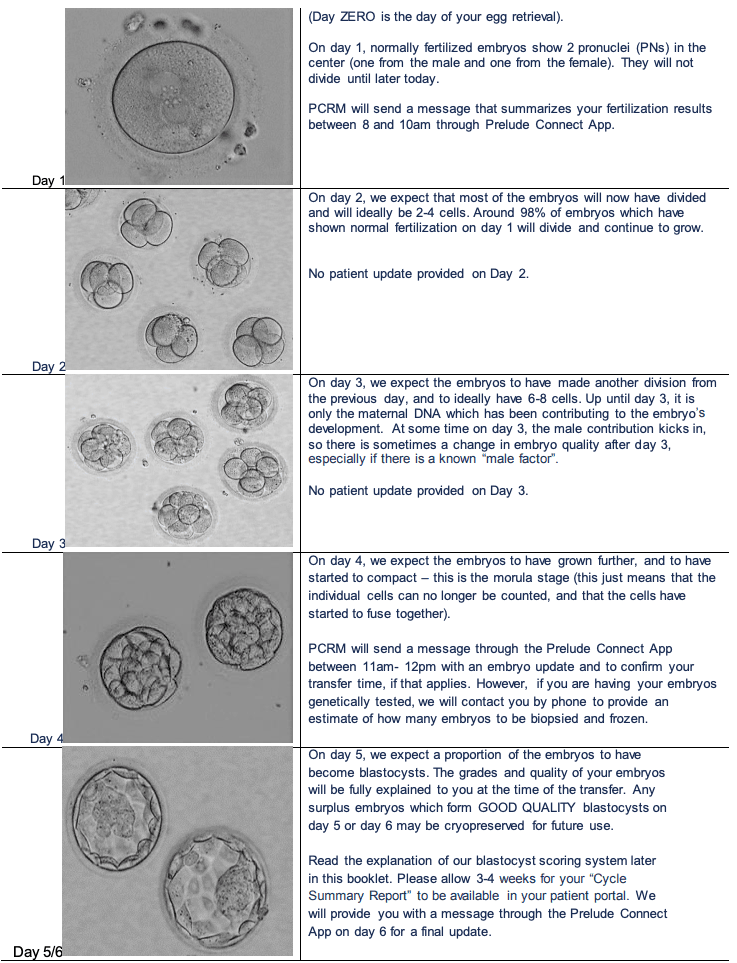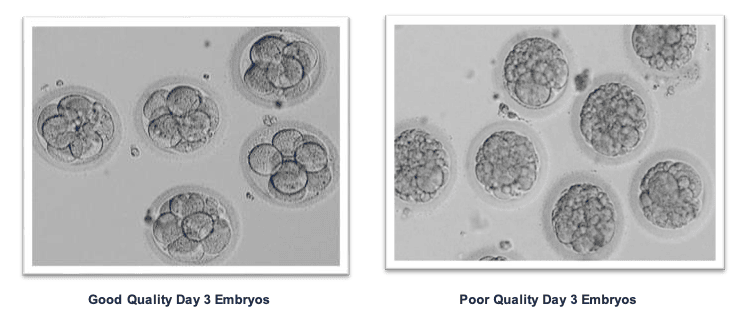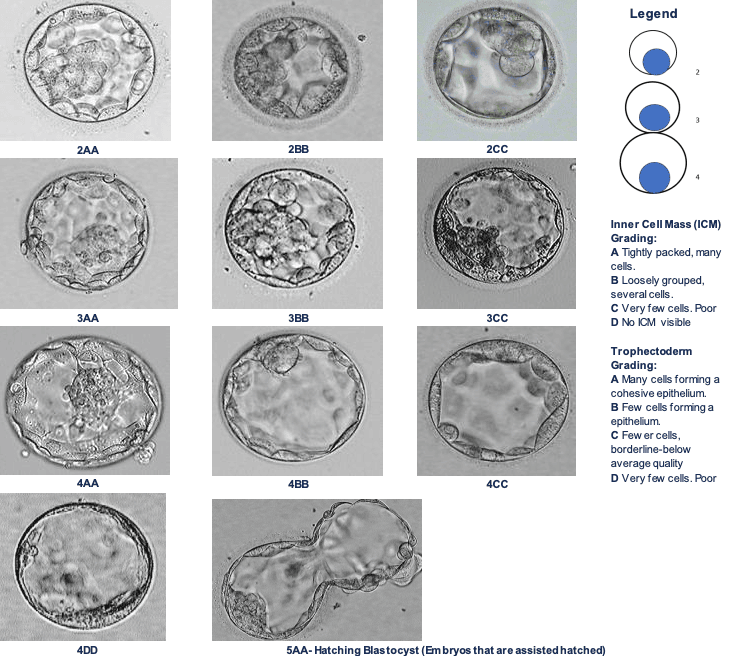Disclaimer: The information on this page applies only to PCRM’s Burnaby and Victoria fertility clinics.
What to Expect While Your Embryos Are in The IVF Laboratory
The laboratory component of your IVF journey should not be mysterious, and we always welcome your questions. The science behind growing embryos in vitro is constantly evolving as we strive to make the culture environment as natural as possible to optimize your chance of success. It is now standard practice to grow embryos for 5 or 6 days before transfer and/or freezing (when they will have reached the “blastocyst” stage) as this has some very important advantages:
- Growing embryos for 5 days instead of 3 is an excellent selection tool: only a proportion of embryos will become blastocysts, the others will stop growing.
- If the embryo becomes a blastocyst, it has a much higher chance of implanting. This means fewer embryos can be transferred to achieve a healthy pregnancy, and the risk of multiples is subsequently reduced. It also allows us to eliminate poorer quality embryos which would not have made a pregnancy.
- For successful implantation, the stage of the embryo and the lining of the uterus must be “in sync”, and this is more easily achieved when the embryo is at the blastocyst stage, matching more closely with what happens in a natural cycle.
At PCRM we have a reliable, reproducible culture system, and because of this we are happy to grow everyone’s embryos to day 5 before transfer. There is no way to know for sure whether all embryos that fail in culture would also have failed in utero, but we believe that there is no harm caused to your embryos by five days of growing in the lab. What follows is a brief outline of what will be happening to your embryos for the six days that they will be in the lab.
When Will I Get an Update?
- We will provide you with an update through our messaging portal, Prelude Connect App. You will find these messages under “Embryo Update”.
- You will normally receive a message from the Embryology department between 8:00-10:00am with fertilization results the day after your egg retrieval. On the fourth day of your embryo culture, the Embryo Update will be sent to you between 11am-12:00pm. If you have signed up for genetic testing of the embryos, we will call on day 4 to confirm that you are comfortable proceeding with the genetic testing.
- Should anything unexpected arise with your embryos in culture, we will contact you by phone to discuss the progress.
- If our message is a bit delayed, especially on weekends, please don't worry. It simply means we are busy in the Lab, but rest assured, we won't forget to update you!
- Please allow 3 to 4 weeks after your cycle for a notification indicating that your “Cycle Summary Report” is available in your patient portal. You can view this document in your patient portal under the “Documents” tab.
This report will provide you information about your fertilization, embryo development, photos of embryo(s) transferred, details of the semen, and the grades of your frozen embryo(s).
Embryo Development from Day 1 to Day 6
We will NOT provide any updates on day 2 or day 3.

Patient FAQs
Do You Grade The Embryos?
Yes! Yes, we do! We use two embryo scoring systems to describe embryos at different stages.
From day 2 to day 4, we score cleavage embryos on a scale from 1 - 5.
1 = excellent
2 = good
3 = average
4 = a little below average
5 = below average (poor).
If embryos are graded 1-3, we are happy with their quality. If they are graded 4 and 5, we will caution you that those will likely have a lower chance of becoming blastocysts. The most important thing is that there is daily progression of the embryos. However, if an embryo is too far behind the ideal time points that we look for, it is less likely to be successful in causing a pregnancy. It is perfectly normal to have a mixture of embryo stages and grades, especially when you have a larger number of embryos.
Once the embryo becomes a blastocyst on day 5 or on day 6, its score describes the parts of the blastocyst, and consists of a number followed by 2 letters (for example 4AA). This scoring system and what it means will be fully explained to you before your transfer. Like most IVF Clinics, we use the Gardner Grading System for blastocysts. Read further in this booklet to see a visual explanation of both the cleavage and blastocyst grading system.
Embryo Transfer – Important Instructions
You will be given your transfer time when we send you a message through the Prelude Connect App on day 4. Transfer time is usually mid to late morning. Please remember to arrive at PCRM 30 minutes before the scheduled time. Take your medications as you normally would on the morning of your transfer, and make sure that your bladder is comfortably full - this will make it easier for the Physician to have a clear picture for your ultrasound-guided transfer. Drink 3-4 glasses of water 1-2 hours before the scheduled transfer time.
Will You Freeze Surplus Embryos?
On average, we expect around 50% of good quality day 4 embryos to develop into blastocysts (remember, this is an average for ALL patients therefore, some patients will have more embryos to freeze, and some may have less). On average, we freeze 70% of blastocysts. Blastocysts must be of good quality, or they will not survive the freezing or thawing processes. We will not freeze blastocysts of poor or sub-optimal quality, as they are not likely to survive.
What if my Embryos Are Not Blastocysts on Day 5?
Sometimes embryos will not have reached the blastocyst stage at the time of your transfer on day 5 - do not worry, this happens often. If your embryos continue to grow each day, we will still transfer one or two of the most advanced embryos and grow all the others for one more day. You will receive a final message through the Prelude Connect App from the Laboratory on day 6 to inform you of any embryos that were frozen. Freezing can be done on day 5 or on day 6 – we wait until the blastocysts have developed the ideal number of cells before we freeze it.
On Day 4, How Do You Estimate How Many Embryos Will Be Frozen or Biopsied?
All of our Embryology staff have experience in estimating blastocyst formation numbers, using both clinic statistics and by observing how your embryos have developed over a four-day period. The estimate is based on our conservative “educated guess” and is the best estimate we can give at the time. The number being frozen or biopsied may end up being more or less than what we have estimated.
If you are having a “freeze all” cycle, or a PGT cycle, we will not update you on day 5, but we will update you sometime on day 6 with a final update.
Embryo Grading for Cleavage Stage Embryos (Day 2 to Day 4)

- If your embryos are graded 1, 2 or 3 we are happy with their quality, and these are the grades we see for most people each day in the lab.
- Most patients will have a mixture in the quality of their embryos, and this is normal, especially if you have a larger number of embryos.
- If your embryos are graded 4 or 5, they are of poorer quality. This does not mean they will not lead to a pregnancy, but we may caution you that they are less likely to make blastocysts, and less likely to implant.
- Remember, even if all of your embryos are perfect on day 4, on average only 50% of them will become blastocysts on day 5.

Embryo Grading for Blastocyst Stage Embryos (Day 5 to Day 6)

- On average, 50% of embryos which are “good” quality on day 4 will progress to a blastocyst stage.
- The number in the score refers to the size of the blastocyst, and it changes quite rapidly on day 5.
- Inner Cell Mass (the first letter in the score) = the tight ball of cells inside the blastocyst which will eventually become fetal tissue.
- Trophectoderm (the second letter in the score) = the surrounding cells which will become the placenta.
- Grades A and B, expanded to size 2, 3 and 4 are all good quality embryos and can be frozen. There is little difference in the potential to implant between blastocysts graded AA or BB.
- Blastocysts with a “C” grade in their trophectoderm have a lower chance of implanting but can still make pregnancies. Grade C trophectoderm embryos may be frozen depending on their development in the laboratory. These may have a lower survival rate during the freeze/thaw procedure.
- Blastocysts with a “C” grade in their ICM will not be frozen due to insufficient cells to form the future fetal tissues.
Experience Exceptional IVF Support & Guidance at PCRM
IVF is a beautifully complex procedure, one that PCRM strives to demystify as much as possible for our patients. We believe that a comprehensive IVF journey needs to ensure that all aspects of laboratory components and the embryo grading process are easily understood and accessible. Thanks to our Prelude Connect App we can easily communicate with patients about any embryo updates, including embryo development, images, and more. We’re also here to provide patient education and address all questions and concerns about embryo grading or any other aspect of the IVF process. For an exceptional IVF and fertility clinic experience in Burnaby and Victoria, British Columbia, connect with PCRM today to request a consultation.
